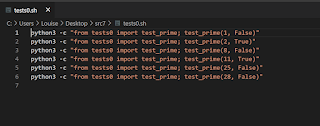Makes me feel le somethng of a code jockey: I now know how
(complex) programs are tested as they evolve. And it involves testing whether
expected values are true or not ie the process is automated so that
anyone running the test can see what is going on...
Python recognizes the assert command as a request for a boolean on an expression.
If true, nothin; if false, an error is thrown.
All well and good, 10 squared is not 101. for a moew complex example, one
might be tempted to just test the program a few times. Again, there is a procedure
within Python, whcih involves expected examples in a test unit.
Here a code unit (with a (sh) extension is a shell command). This allows
the coder to run the test himself.
The lecture itself contains an interesting instance of an
error from faulty code in a function. If we define is_prime
as follows, then we raise an error on 25 and 8.
The issue: the notion of range. which does not include the second
term as such. For example, range(1, 10) would go from 1 and include 9
but not 10.
For 25, we are not picking up that the integer 5 squared gives 25, and
thus 25 is not prime. For 8, we end up with range(2, not including2) which
triggers the else condition of True.
The same situation arises from both the shell code and the unittest. Prime
is just not built-in anywhere.











No comments:
Post a Comment